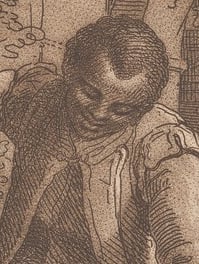

Ottobah Cugoana - Abolitionist
Ottobah Cugoano was stolen from his home and enslaved, he went on to write one of the most powerful condemnations of slavery. Cugoano was born around 1757 in present-day Ghana. He was kidnapped and sold into slavery and taken to Grenada in the Caribbean where he was forced to work on a plantation - Cugoano was just a teenager. He endured violence, beatings and hunger.
In 1772, Cugoano was bought by the British merchant Alexander Campbell and brought to England. The same year he was freed due to the landmark Somerset ruling which effectively declared slavery unlawful.
Cugoano was baptised the following year and given the name “John Stuart”
He found work as a servant to artists Richard and Maria Cosway. Whilst working for them he was allowed to learn to read and write. Cugoano began actively campaigning against slavery. In 1786, he helped save a Black man named Henry Demane from being illegally shipped back into slavery. With the help of abolitionist Granville Sharp they managed to intervene just before the ship Demane was aboard departed, securing his freedom.
In 1787 Cugoano published his landmark book: Thoughts and Sentiments on the Evil and Wicked Traffic of the Slavery and Commerce of the Human Species. It was the first personal account of slavery in English written by a Black person. His writing was bold and direct.
Cugoano was a founding member of The Sons of Africa —thought to be Britain’s first Black political organisation they campaigned for the total abolition of the transatlantic slave trade. The group was made up of formerly enslaved Africans including Olaudah Equiano. The group lobbied members of Parliament and wrote letters to newspapers.
Cugoano dreamed of establishing a settlement in Sierra Leone for formerly enslaved Africans. Though that vision didn’t come to existence during his life time the seed had been planted.
Ottobah Cugoano died in 1791.
'He that flealeth a man and felleth him, or maketh merchandize of him, or if he be found in his hand, then that thief fhall die
LAW OF GOD'
The opening page of Cugoano's 1787 book. Although written in old English we get the gist. Cugoano's stance is clear
Want information about community jobs? Click HERE
